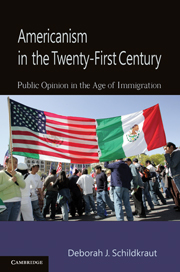Book contents
- Frontmatter
- Contents
- Figures and Tables
- Acknowledgments
- 1 Introduction: American Identity in the Twenty-First Century
- 2 The Twenty-First-Century Americanism Survey
- 3 Defining American Identity in the Twenty-First Century
- 4 Policy Implications of Multidimensional Americanism
- 5 The Myths and Realities of Identity Prioritization
- 6 Does “Becoming American” Create a “Better” American?
- 7 Immigrant Resentment: When the Work Ethic Backfires
- 8 The Politics of American Identity
- Appendix A 21-CAS Survey Questions
- Appendix B Supplementary Tables from Chapter 3
- Appendix C Supplementary Tables from Chapter 5
- Appendix D Supplementary Tables from Chapter 6
- Appendix E Supplementary Tables from Chapter 7
- References
- Index
8 - The Politics of American Identity
Published online by Cambridge University Press: 05 June 2012
- Frontmatter
- Contents
- Figures and Tables
- Acknowledgments
- 1 Introduction: American Identity in the Twenty-First Century
- 2 The Twenty-First-Century Americanism Survey
- 3 Defining American Identity in the Twenty-First Century
- 4 Policy Implications of Multidimensional Americanism
- 5 The Myths and Realities of Identity Prioritization
- 6 Does “Becoming American” Create a “Better” American?
- 7 Immigrant Resentment: When the Work Ethic Backfires
- 8 The Politics of American Identity
- Appendix A 21-CAS Survey Questions
- Appendix B Supplementary Tables from Chapter 3
- Appendix C Supplementary Tables from Chapter 5
- Appendix D Supplementary Tables from Chapter 6
- Appendix E Supplementary Tables from Chapter 7
- References
- Index
Summary
The question of what it means to be American has preoccupied Americans, not to mention foreign visitors such as Alexis de Tocqueville and James Bryce, since the founding of the country. Debating that question means debating the legal, territorial, and conceptual boundaries of membership. For much of American history, legal and conceptual boundaries have been determined in part by physical characteristics. In 1790, Congress passed the country's first naturalization law, which restricted naturalization to free whites. This restriction remained in place until 1952 (Pickus 2005). Today, legal boundaries are determined by beliefs and behaviors. Once the requisite five-year waiting period has passed, a person can naturalize if he or she is willing to take an oath of allegiance to the Constitution, can pass a civics test that shows an understanding of American history and political institutions (and basic knowledge of English), and is “of good moral character.” In short, if you understand us, believe in us, and obey the law, then you can become one of us. The beliefs and sympathies of potential new members were a concern at the founding as well, but that concern existed alongside powerful racial restrictions. Conceptual boundaries have evolved much the way legal boundaries have, although there is still a portion of the American public that overtly delineates American identity in ascriptive terms. Even among people who reject ascriptivism, there can still be an overlearned tendency to assume that people who are not white or who have an accent are foreigners.
Regardless of whether the boundaries in question have been ascriptive or normative, being concerned about the nature of American identity inevitably means being concerned about immigration. Even the most politically apathetic American probably knows that the country's demographic makeup has diversified substantially over the past several decades. Today, the foreign born comprise roughly 13 percent of the population, compared to 6 percent in 1980. The United States has not experienced such high levels of immigration, proportionally, for one hundred years. These changes are not just being felt in border states. Interior states such as Iowa, Nebraska, and Kansas are also seeing notable increases in their immigrant populations. It is also essential to note that most of today's immigrants are coming from Latin America and Asia. In 2000, 52 percent of the foreign born were from Latin America, compared to only 9 percent in 1960. Comparable numbers for Asians are 26 percent in 2000 and 5 percent in 1960. Consequently, contending with immigration also means contending with new languages and traditions to which many Americans are not accustomed.
- Type
- Chapter
- Information
- Americanism in the Twenty-First CenturyPublic Opinion in the Age of Immigration, pp. 195 - 210Publisher: Cambridge University PressPrint publication year: 2010

